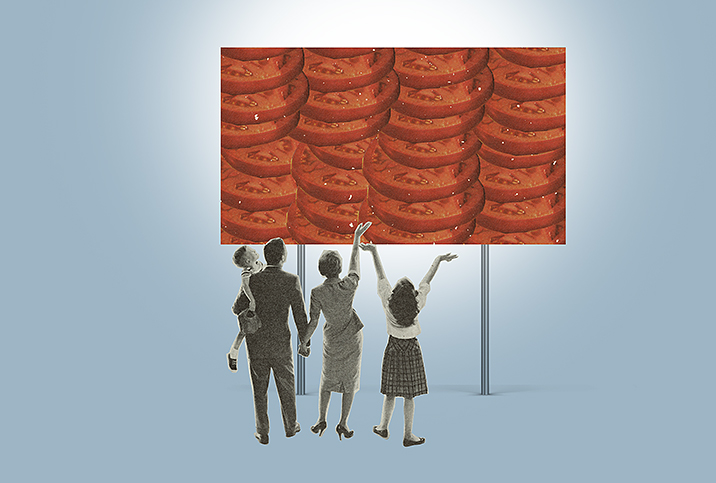Hunting For Whole Foods, Not Meat, May Help With ED

Since the dawn of time, human beings have been known as meat-eaters. After all, prehistoric cave drawings depict hunters hurling spears at bulky beasts, not slaying a field of vegetables to fill a salad bowl. Today, the average American consumes about 225 pounds of meat each year.
Implicit in the carnage is the idea that eating meat is somehow more "manly." Studies have even been conducted on food and gender roles. Evolution must be slow, though, because in some men's minds, the ancient stereotype remains: Meat equals masculinity.
"I think the rationale, at least among men, is that you need to be consuming a lot of protein and you need to be consuming animal-based protein and meat products to maintain testosterone levels," said Ranjith Ramasamy, M.D., a urologist and researcher with the University of Miami Miller School of Medicine, at a September 2021 American Urological Association press conference.
This sounds like Neanderthal thinking, and in fact, a 2020 study by a team including Ramasamy showed testosterone levels don't vary between men who observe a meat-filled diet and those who follow a plant-based diet.
Men who are concerned about erectile function may want to spend less time at the barbecue pit and more time in the garden.
Ramasamy and his peers dived deeper into possible links between plant-based diets and men's sexual health in a 2021 study, and found encouraging results: Plant-based diets are associated with a reduced risk of erectile dysfunction (ED).
"This study revealed that healthy, plant-based diets are independently associated with a decreased risk of erectile dysfunction, regardless of BMI [body mass index], age, smoking history or other chronic medical conditions," Ramasamy said in an email.
In other words, men who are concerned about erectile function may want to spend less time at the barbecue pit and more time in the garden.
How diet may affect erectile function
Erectile dysfunction is largely a blood-flow problem, said Stacy Loeb, M.D., a professor of urology and population health at New York University and the Manhattan Veterans Affairs Hospital. A man's vascular system must work properly for erections to occur, and any interruption in blood flow can potentially lead to ED.
A plant-based diet has been shown to benefit vascular health; in turn, Ramasamy said there are several potential ways in which plant-based diets may decrease the risk of ED.
"First, we already know that vegetarian diets can reduce risks of obesity, coronary heart disease and type 2 diabetes," he said. "All of [these] are chronic, noncommunicable diseases that are implicated in vascular dysfunction, and vascular dysfunction is the primary mechanism behind erectile dysfunction. Second, we have good reason to believe that the dietary fibers and polyphenols have anti-inflammatory and antioxidant effects, which could also improve erectile function."
Polyphenols are naturally occurring compounds that are abundant in plants and have become a focal point of nutrition research because of their role in regulating various bodily functions.
The basics of the study
Converting to a plant-based diet has become a popular trend in recent years, study coauthor Ruben Blachman-Braun, also of the Miami medical school, said during the AUA press conference. He cited a survey indicating 39 percent of Americans are actively trying to increase their intake of plant-based foods.
However, he said research on the plant-penis connection is lacking. On the flip side of the menu, previous studies have shown meat consumption increases the risk of erectile dysfunction, according to Loeb.
The new study looked at dietary patterns as a whole rather than merely the benefits of individual foods. Researchers collected and analyzed existing data from 2,549 men in the National Health and Nutrition Examination Survey database. The men's ages ranged from 41 to 64, their mean BMI was 28.8 (30 and higher is considered obese) and 57.4 percent of them had some degree of ED.
Participants detailed their eating habits by completing the Food Frequency Questionnaire. From this survey, a plant-based dietary index (PBI) and a healthful plant-based dietary index (hPDI) were developed. This distinction was made because some plant-related foods, such as fruit juices and other sweetened beverages, refined grains, potatoes, processed foods, sugar and desserts, are less healthy than others. A healthy, whole-foods approach includes fruits, vegetables, whole grains, legumes and nuts, among other items.
The indices were essentially scoring systems: The more plant-based foods each man consumed, the more points he received. Researchers observed that for each unit increase in hPDI, there was a decrease in the risk of ED. In other words, the men who had the highest consumption of healthy plant-based foods had a significantly lower risk of erectile dysfunction, Loeb said.
"It is important to note that this association was only significant with men who consumed the highest proportions of 'healthy' plant-based foods, meaning fruits, vegetables and whole grains as opposed to sweets and fried foods," Ramasamy said.
The impact of the study
Loeb noted the study found an "association" between a healthful plant-based diet and a lower risk of ED. The study was observational rather than interventional, meaning analysis was based on existing data, and subjects were not assigned to follow a specific diet. Cause-and-effect is not determined in observational studies.
It's difficult to quantify how much a plant-based diet can help erectile function, Ramasamy said, but the study could set the stage for future experiments. He would like to see a controlled trial in which erectile function is assessed before, during and after a long-term plant-based diet is implemented, so researchers could better quantify the effects.
"For now, we cannot say that a plant-based diet alone would improve ED, and we would recommend that it is only one component among a series of lifestyle choices that can help patients improve their erectile function," Ramasamy said.
For example, obesity is a significant risk factor for ED, and eating a plant-based diet, along with exercising, can help people lose weight. Loeb said people who follow this diet also gain less weight as they age.
Food for thought
The practical application of the study will be seen when doctors routinely recommend healthy plant dishes as part of an approach to prevent or improve erectile dysfunction.
"For patients with ED, I would suggest they switch to a plant-based diet or at least incorporate more healthy plant-based foods overall as a potential lifestyle improvement they could make, especially given the other known health benefits of plant-based diets," Ramasamy said.
Loeb echoed this viewpoint.
"The evidence is clear that consuming more healthful plant-based foods is good for your heart, good for your prostate and good for sexual health, so there's really no downside," Loeb said. "I would recommend this approach to people who are concerned about their risk of cancer and their sexual health."
Sexual health is obviously a priority for many people, and Loeb hopes the study motivates men to consider making positive lifestyle changes for all aspects of their health, including erectile function.
"This myth that has been propagated about meat and masculinity or meat and erectile dysfunction has really been disproven," she said. "What we're seeing here is eating more plant-based foods is the way to maintain erectile function."


















